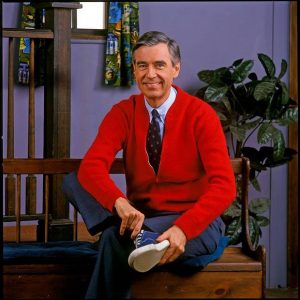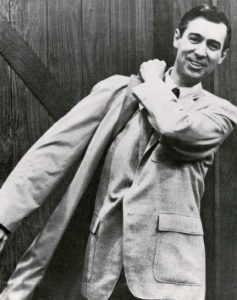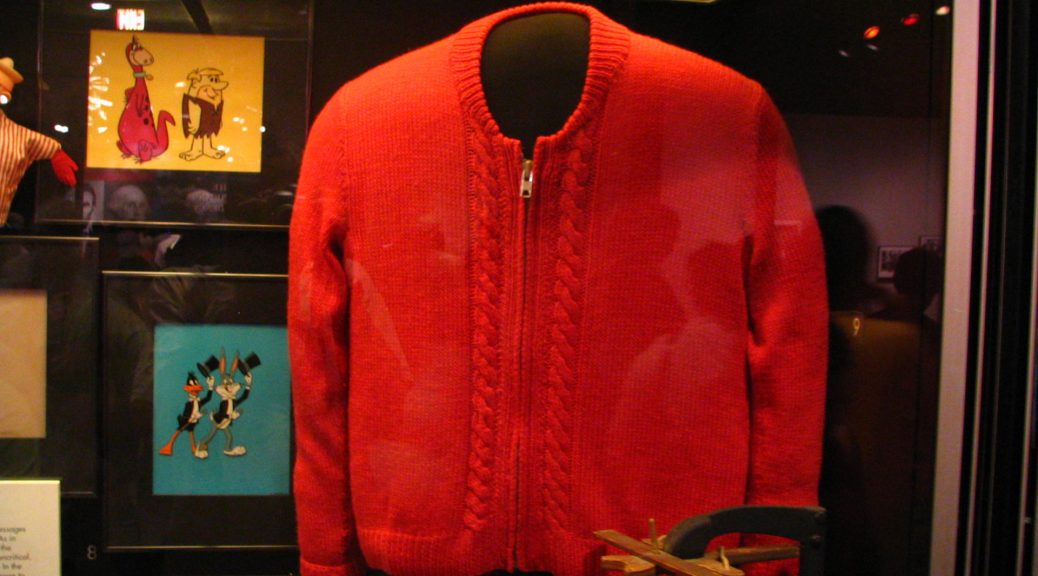A Sermon by the Rev. Dr. Arthur M. Suggs
Preached on Rally Day, September 16, 2018
Lectionary Reading: Luke 10: 25-37.
Mr. Rogers Visits Our Church, Spills the Beans, Reveals His Many Anxieties to a Psychiatrist
In the guise of Mr. Rogers, our world traveler temporarily returned to home base for a short time only to surprise us with more frequent and longer disappearances without asking our approval.
This time, he entered singing as though at home with nothing to do but to change from his outdoor spiffiness into a cardigan sweater and loafers.
“Oh, goodness, I’ve been more nervous about that than anything. But thank you. It’s good to be back,” he said, while dreams of shedding his heavy schedule of sermons must have harbored in his mind. “I’ve had a marvelous sabbatical, and there are stories to tell, of course, for another time.”
As you are aware, we thought the tribute to Mr. Rogers would be an appropriate theme for Rally Day —gathering together again after the summer break.
There’s a version of this show that actually began five years earlier, in 1963, on a tiny network, but it was picked up by PBS in February of 1968. And so that’s why 2018 is the Golden Anniversary.
Personally, I’m more of the Captain Kangaroo generation, a little older, but “Mr, Rogers’ Neighborhood” surpassed “Captain Kangaroo” in popularity a long time ago. Then in turn, it was surpassed by “Sesame Street.”
Mr. Rogers’ cardigan, by the way, is on display at the Smithsonian Institution. I have not seen it, but in my imagination, it’s just down the hallway from the set for “All in the Family” with the two chairs, which I have seen — things that have to do with our culture over time.

Two documentaries have been produced on Mr. Rogers a number of years ago. The first is called “Mr. Rogers and Me,” and the other one was in celebration of his Golden Anniversary, “Won’t You Be My Neighbor?”
In those documentaries, we learned more about Fred Rogers the man, his anxieties, the fact that he needed to see a psychiatrist on a regular basis to deal with his anxieties.
We learn that he was born into a wealthy family. His father was a rather successful businessman. His mother was an heiress from one of the Pittsburgh industrialists, so there was serious money there, to the point that his mother was a very generous soul.
She gave out about 1,500 Christmas gifts every year to the various students in the schools where her sons attended, such that the school nurse in the elementary school in Altoona would buy shoes, clothes, eyeglasses, even sometimes furniture, and she would just have the bill sent to Mrs. Rogers.
They lived on Mellon Street, after Andrew Mellon. The young Mr. Rogers, Fred, had a serious gift, and it’s always wonderful when a person uses whatever their gift is for the benefit of humanity. His gift was that not only could he think like an adult — after all, he ran a TV show, he ran a business, he hired people, he wrote the music, he did the narration — but he also had the ability to think like a child.
Remember that this show was picked up in February of 1968. That was a really tumultuous time. Racism, Vietnam war, assassinations, and he had the ability to address the anxieties and the fears, the worry, the questions of little kids.
The Four Lessons of Major Themes of Mr. Rogers’ Neighborhood Was Love

And so this morning, there was a banner over the pulpit that says, “It’s a Beautiful Day in the Neighborhood,” the theme song of Mr. Rogers’ show.
In addition to my little skit opening the sermon, Judy Garnar will be peppering some of his quotes throughout the worship service.
What I would like to do with the sermon is to point out four themes.
There are many, but I chose four that I felt are particularly meaningful from his life, from his words, and from his TV show.
The four lessons:
#1: “Stand up for What You Believe in!”
#2: “We Can Work to Make a Difference Right Where We Are!”
#3: “We Are Neighbors!”
#4: “Just Being You Is Enough!”
(Explore the reflections on each in the full sermon – download below.)
How Far Does Your Neighbor hood Extend? Do You Believe You Are Lovable as You Are?
A quick review of the four main themes of Mr. Rogers’ show (and body of work):
• Stand up for what you believe in.
• We can work to make a difference right where we are.
• We are neighbors.
• Just being you is enough.

Officer Clemmons and Mister Rogers, reprising their 1969 foot bath more than two decades later, during their final scene together in 1993. C. The Fred Rogers Company, via NPR.
And here are two questions in conclusion. These are going to be hard:
- How far does your neighborhood extend? How far does your concept of neighbor extend out into the world?
We care about those immediately around us. We probably care about those in North Carolina. Do we care about those in China, where their typhoon is much worse than Florence?
Wherever we draw the line, and we all do, are you willing to push it out a bit farther?
2. Do you believe that you are lovable just the way you are right now?
We all have shortcomings and inadequacies, but can we believe that God, and a whole lot of people too, love us just as we are?
And then, in turn, can we love others just the way they are, despite their deeper and more obvious shortcomings and inadequacies?
Amen.
Download the full With Loving Abandon sermon here.
Featured Image Credit: Sweater worn by Fred Rogers, now on display in the Smithsonian Institution’s Museum of American History. Fred Rogers’ mother, Nancy Rogers, knitted all the sweaters he wore on the program. Creative Commons, Wikimedia.
Image of Fred Rogers and Dr. Francois Clemmons – see the NPR story Walking the Beat in Mr. Rogers’ Neighborhood.

